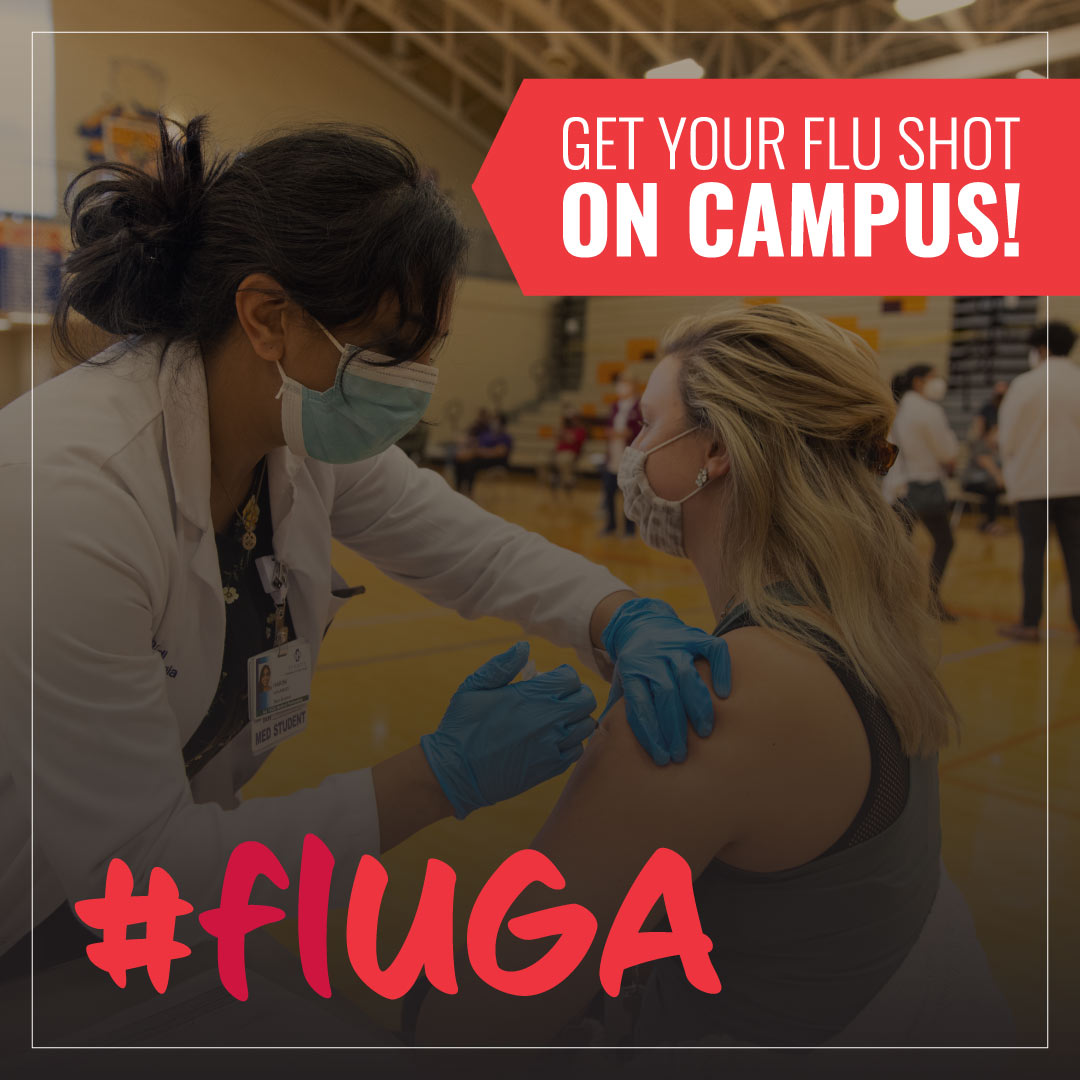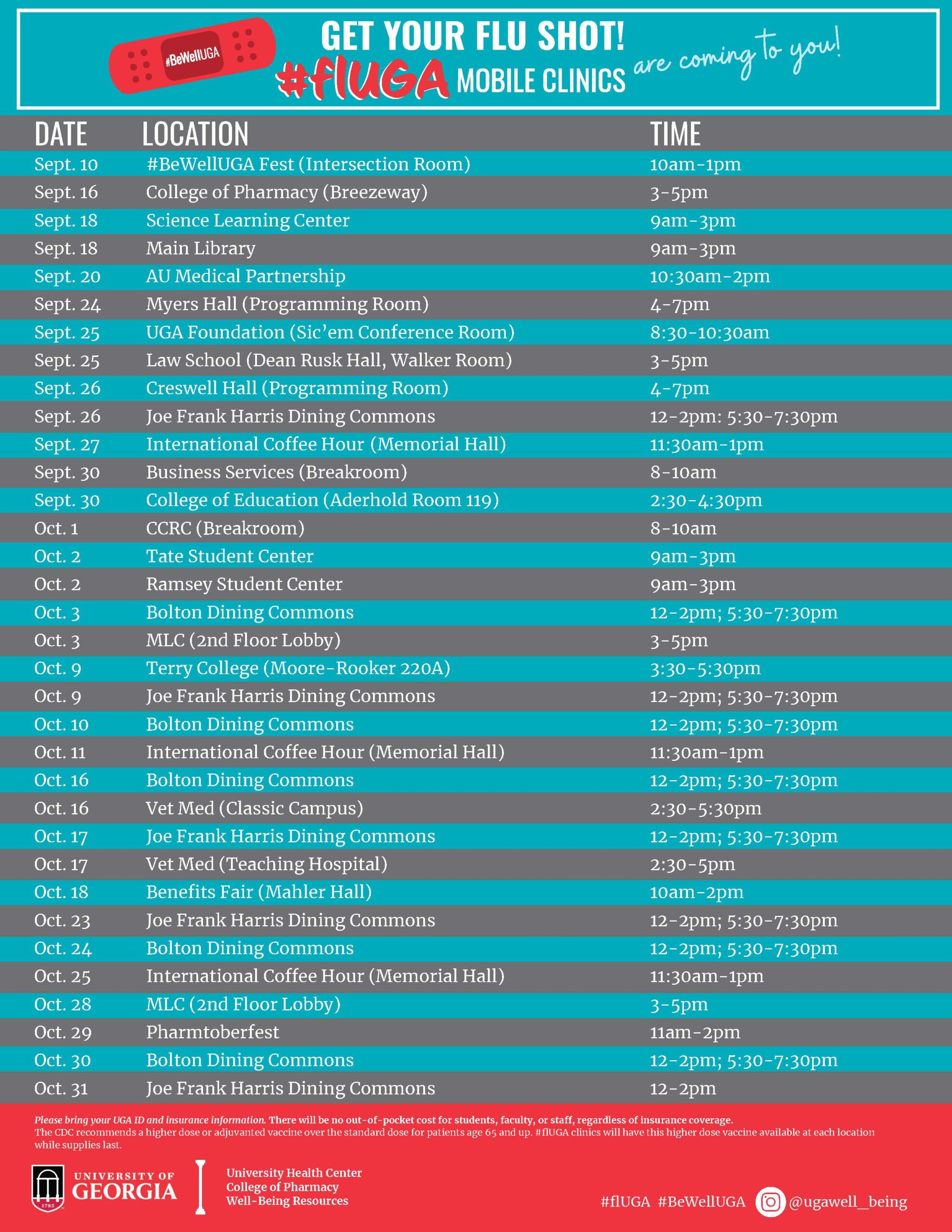INFLUENZA
Home » Health Topics » Influenza


WALK-IN FLU SHOTS
Faculty, staff, and students may walk-in without an appointment to the UHC Pharmacy Mon-Fri 9:00-5:00.
BY APPOINTMENT
Students may make an appointment with their Primary Care Clinic via the Patient Portal or by calling 706-542-1162.
Faculty/Staff may make an appointment with Allergy/Travel Clinic by calling 706-542-5575.
FLUGA MOBILE CLINICS
Check out the Fall 2024 schedule and get your flu shot!

What is influenza?
Influenza (the flu) is a contagious respiratory illness caused by influenza viruses that infect the nose, throat, and sometimes the lungs. Influenza can cause mild to severe illness. There are antiviral medications available to reduce the severity of illness. The best way to protect against getting the flu and reducing your risk of complications if you do get the flu is to get a flu vaccine every year.
Influenza (the flu) is a contagious respiratory illness caused by influenza viruses that infect the nose, throat, and sometimes the lungs. Influenza can cause mild to severe illness. There are antiviral medications available to reduce the severity of illness. The best way to protect against getting the flu and reducing your risk of complications if you do get the flu is to get a flu vaccine every year.
What are the signs and symptoms of influenza?
The flu usually comes on suddenly and may include symptoms such as fever or chills, headache, fatigue or tiredness (can be extreme), dry cough, sore throat, nasal congestion, and muscle and body aches. These symptoms are usually referred to as “flu-like symptoms.”
The flu usually comes on suddenly and may include symptoms such as fever or chills, headache, fatigue or tiredness (can be extreme), dry cough, sore throat, nasal congestion, and muscle and body aches. These symptoms are usually referred to as “flu-like symptoms.”
What should I do if I think I have influenza?
In most cases, people who get the flu will recover in a few days to less than two weeks and do not need medical care or antiviral medication. There are over-the-counter flu tests available at local pharmacies including the UHC Pharmacy.
While sick with the flu, you should stay home, rest, drink plenty of fluids, take over-the-counter medications to reduce fever and pain, and avoid contact with other people to prevent the spread of flu. If contact with other people is unavoidable, then you should wear a mask and practice good hand hygiene.
You may resume your normal activities when for at least 24 hours your symptoms have been improving overall, and you have not had a fever (and are not using fever-reducing medication).
If students are having trouble managing their illness at home or are at an increased risk for complications, then please make an appointment by contacting your home team. You will be asked to wear a mask while you’re at the UHC. If faculty and staff are having trouble managing their flu symptoms at home or are at an increased risk for complications, then contact your healthcare provider. You will be asked to wear a mask if you see your healthcare provider in person.
In most cases, people who get the flu will recover in a few days to less than two weeks and do not need medical care or antiviral medication. There are over-the-counter flu tests available at local pharmacies including the UHC Pharmacy.
While sick with the flu, you should stay home, rest, drink plenty of fluids, take over-the-counter medications to reduce fever and pain, and avoid contact with other people to prevent the spread of flu. If contact with other people is unavoidable, then you should wear a mask and practice good hand hygiene.
You may resume your normal activities when for at least 24 hours your symptoms have been improving overall, and you have not had a fever (and are not using fever-reducing medication).
If students are having trouble managing their illness at home or are at an increased risk for complications, then please make an appointment by contacting your home team. You will be asked to wear a mask while you’re at the UHC. If faculty and staff are having trouble managing their flu symptoms at home or are at an increased risk for complications, then contact your healthcare provider. You will be asked to wear a mask if you see your healthcare provider in person.
How do I protect myself from influenza?
The best way to protect against getting the flu and reducing your risk of complications if you do get the flu is to get a flu vaccine every year. You may also protect yourself by practicing good hand hygiene, avoiding close contact with those who are sick, masking when being around those who are sick is unavoidable, avoid touching your face, and improving your air quality.
The annual flu shot is typically available in early September through late May.
There are many opportunities to obtain a flu shot on campus, and there is no out-of-pocket cost for students regardless of insurance status:
Students may make an appointment with their home team.
Students, faculty, and staff may walk-up to any pop-up flu clinic around campus during the annual FlUGA campaign in September and October.
Students, faculty, and staff may make an appointment with the Allergy/Travel Clinic.
Students, faculty, and staff may walk-in to the UHC Pharmacy Mon-Fri 8:00-5:00.
If you’d like more information about the flu vaccine, then visit the CDC’s Flu Vaccination page.
The best way to protect against getting the flu and reducing your risk of complications if you do get the flu is to get a flu vaccine every year. You may also protect yourself by practicing good hand hygiene, avoiding close contact with those who are sick, masking when being around those who are sick is unavoidable, avoid touching your face, and improving your air quality.
The annual flu shot is typically available in early September through late May.
There are many opportunities to obtain a flu shot on campus, and there is no out-of-pocket cost for students regardless of insurance status:
If you’d like more information about the flu vaccine, then visit the CDC’s Flu Vaccination page.
- Sept 10 – #BeWellUGA Fest (Intersection Room) – 10am – 1pm
- Sept 16 – College of Pharmacy (Breezeway) – 3 – 5pm
- Sept 18 – Science Learning Center – 9am – 3pm
- Sept 18 – Main Library – 9am – 3pm
- Sept 20 – AU Medical Partnership – 10:30am – 2pm
- Sept 24 – Myers Hall (Programming Room) – 4 – 7pm
- Sept 25- UGA Foundation (Sic’em Conference Room) – 8:30 – 10:30am
- Sept 25 – Law School (Dean Rusk Hall, Walker Room) – 3 – 5pm
- Sept 26 – Creswell Hall (Programming Room) – 4 – 7pm
- Sept 26 – Joe Frank Harris Dining Commons – 12 – 2pm, 5:30 – 7:30pm
- Sept 27 – International Coffee Hour (Memorial Hall) – 11:30am – 1pm
- Sept 30 – Business Services (Break Room) – 8 – 10am
- Sept 30 – College of Education (Aderhold Room 119) – 2:30 – 4:30pm
- Oct 1 – CCRC (Breakroom) – 8 – 10am
- Oct 2 – Tate Student Center – 9am – 3pm
- Oct 2 – Ramsey Student Center – 9am – 3pm
- Oct 3 – Bolton Dining Commons – 12 – 2pm, 5:30-7:30pm
- Oct 3 – MLC (2nd Floor Lobby) – 3 – 5pm
- Oct 9 – Terry College (Moore-Rooker 220A) – 3:30 – 5:30pm
- Oct 9 – Joe Frank Harris Dining Commons – 12 – 2pm, 5:30 – 7:30pm
- Oct 10 – Bolton Dining Commons – 12 – 2pm, 5:30 – 7:30pm
- Oct 11 – International Coffee Hour (Memorial Hall) – 11:30am – 1pm
- Oct 16 – Bolton Dining Commons – 12 – 2pm, 5:30 – 7:30pm
- Oct 16 – Vet Med (Classic Campus) – 2:30 – 5pm
- Oct 17 – Joe Frank Harris Dining Commons – 12 – 2pm, 5:30 – 7:30pm
- Oct 17 – Vet Med (Teaching Hospital) – 2:30 – 5:30pm
- Oct 18 – Benefits Fair (Mahler Hall) – 10am – 2pm
- Oct 23 – Joe Frank Harris Dining Commons – 12 – 2pm, 5:30 – 7:30pm
- Oct 24 – Bolton Dining Commons – 12 – 2pm, 5:30 – 7:30pm
- Oct 25 – International Coffee Hour (Memorial Hall) – 11:30am – 1pm
- Oct 28 – MLC (2nd Floor Lobby) – 3 – 5pm
- Oct 29 – Pharmtoberfest – 11am – 2pm
- Oct 30 – Bolton Dining Commons – 12 – 2pm, 5:30 – 7:30pm
- Oct 31 – Joe Frank Harris Dining Commons – 12 – 2pm
